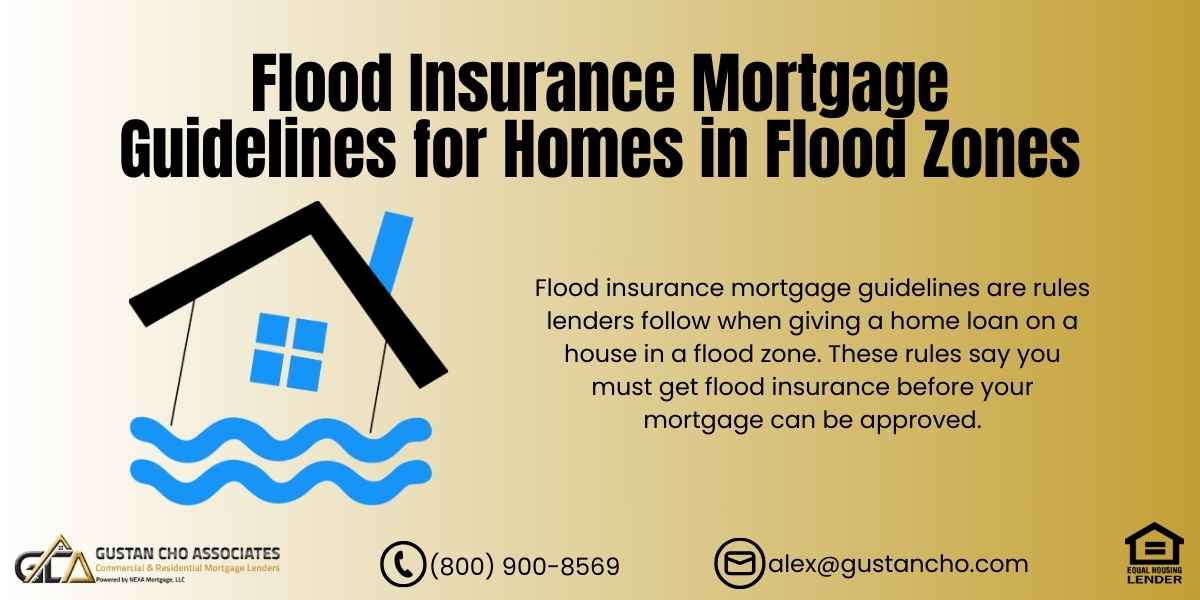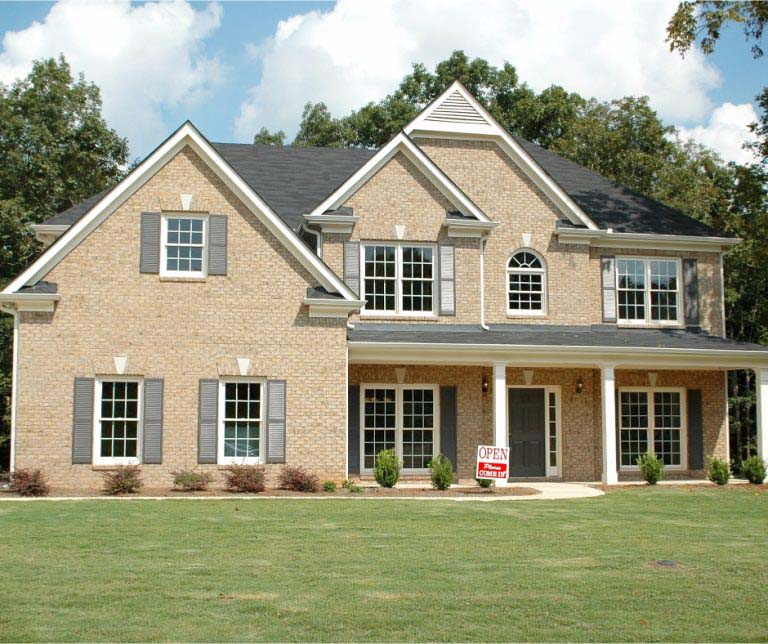Flood Insurance Mortgage Guidelines: What Homebuyers Need to Know in 2025
Buying a home is a huge milestone, but what if your dream home sits in a flood zone? Flood insurance can greatly influence your mortgage approval and monthly payment. In this updated guide, we break down everything you need to know about flood insurance mortgage guidelines in 2025. We use easy-to-understand language to help you feel confident and prepared.
Why Flood Insurance Matters When Getting a Mortgage
Floods can be caused by hurricanes, heavy rains, flash flooding, and even issues in the sewers. Flooding has been recorded for hundreds of years in our country. This has helped create the HUNDRED YEAR FLOODPLAIN map. The Federal Emergency Management Agency or FEMA has an interactive map available here. You may check if your property is located in a flood zone or not. In this article, we will discuss and cover Flood Insurance Mortgage Guidelines With Homes In Flood Zones.
Flooding is a big problem in the U.S. and causes much damage yearly. Because of this, lenders are cautious about giving out loans for homes that could be harmed by floods. If your house is in a high-risk flood zone, you must follow flood insurance mortgage guidelines.
This means you have to buy flood insurance to protect your home. Lenders want to make sure that you are covered in case of a flood, so they ask for this insurance before they let you borrow money for a house.
Flood insurance mortgage guidelines are rules lenders must follow when approving home loans in these zones. These rules protect both you and the lender.
Why Homeowners Insurance Matters When Getting a Mortgage
Apply Now And Get recommendations From Loan Experts
What Is Flood Insurance?
Flood insurance is an independent insurance policy designed to safeguard your home and possessions in the event of damage caused by flooding. It’s different from your standard homeowner’s insurance, which usually doesn’t cover flooding.
If your home is in a flood zone, flood insurance mortgage guidelines require you to get coverage before closing your mortgage.
What Zones Require Flood Insurance?
The Federal Emergency Management Agency (FEMA) creates flood maps that depict different risk areas.
- High-risk zones (SFHAs): A, AE, AH, AO, V, VE
- Lenders will require flood insurance for homes in these zones.
- Moderate-to-low risk zones: B, C, X, shaded X
- Flood insurance is not required but is still recommended.
To determine if a property is in a flood zone, go to the FEMA Flood Map Service Center and input the address.
What Are Special Flood Hazard Areas (SFHAs)?
SFHAs are areas with a 1% or higher chance of flooding in any given year. If you’re buying a home in one of these zones, flood insurance mortgage guidelines say you’ll need a flood policy before closing.
Even if the home has never flooded, it still counts if it’s mapped in a high-risk zone.
How Flood Insurance Affects Your Loan Approval
Flood insurance affects your mortgage in two significant ways:
- It’s required in high-risk zones.
- It impacts your monthly mortgage payment and debt-to-income ratio (DTI).
Lenders must include the cost of flood insurance when calculating your DTI. If the added cost makes your payment too high, you may no longer qualify for the loan amount you want.
That’s why getting a flood insurance quote early is important. It can help you avoid surprises.
How Much Does Flood Insurance Cost?
The cost depends on:
- The home’s flood zone
- The type of construction
- The elevation of the property
- Coverage amount and deductible
Since 2021, FEMA has used a new system called Risk Rating 2.0 to calculate flood insurance premiums. This new model uses more detailed information, such as distance to water, elevation, and building materials, to determine cost.
Some premiums went up, while others went down, depending on each home’s specific risk. Under Risk Rating 2.0, two houses in the same flood zone can have different rates.
Flood insurance can cost $400 to over $3,000 annually, depending on the risk level.
What Does Flood Insurance Cover?
Flood insurance plans offered by the National Flood Insurance Program (NFIP) consist of:
- Building property: Up to $250,000 in coverage for the structure (foundation, plumbing, HVAC, etc.)
- Personal property: Up to $100,000 for contents inside the home (appliances, furniture, clothing)
Not covered:
- Swimming pools, hot tubs
- Outdoor property like fences, patios, and landscaping
- Temporary living expenses if you have to move out
- Cars and cash
Always review your policy to know exactly what’s covered. Flood insurance mortgage guidelines require minimum coverage levels, but you can add extra protection if needed.
Did you know that homeowners insurance is often a requirement when securing a mortgage?
Apply Now And Get recommendations From Loan Experts
Do Lenders Always Require Flood Insurance?
Not always. It depends on the zone.
- Lenders will require flood insurance if the property is in a high-risk zone.
- If the property is outside a high-risk zone, it’s optional but still a good idea.
Even if it’s not required, some lenders may recommend flood insurance for properties near bodies of water or in areas with a history of flooding.
At Gustan Cho Associates, we work with many lenders who follow flexible flood insurance mortgage guidelines to facilitate approvals.
What Happens If You Don’t Get Flood Insurance?
If your lender requires it and you don’t buy a policy, they won’t approve your loan.
If you already have a mortgage and cancel your flood insurance, your lender may purchase one for you — often at a much higher cost — and add it to your mortgage payment.
Flood insurance isn’t just a rule. It’s protection for you and your home. A single flood can cause tens or hundreds of thousands in damage.
Tips to Lower Flood Insurance Premiums
If you’re worried about the cost, here are a few ways to save:
- Get an Elevation Certificate. Your premium may go down if your home is higher than the base flood elevation.
- Raise your mechanical systems. Moving your furnace or A/C unit above flood level can reduce costs.
- Install flood vents. These let water flow through your foundation and prevent pressure buildup.
- Shop around. While the NFIP is common, private flood insurance is available and may offer better rates.
Inquire with your insurance agent about steps to secure the best deal while adhering to flood insurance mortgage guidelines.
What Happens After You Pay Off the Mortgage?
Once your loan is paid off, you are no longer required to carry flood insurance, even in high-risk areas. But that doesn’t mean you should cancel it.
Floods don’t stop just because you don’t have a mortgage. Many homeowners keep their flood policies in place to protect their investments.
Can You Still Get a Mortgage If a Property Is in a Flood Zone?
Yes! You can absolutely still get a mortgage. Many of our clients buy homes in flood zones every year.
At Gustan Cho Associates, we understand the flood insurance mortgage guidelines and help you:
- Understand your flood zone risk
- Shop for flood insurance
- Get pre-approved with a lender who understands your situation
We work with FHA, VA, Conventional, and non-QM lenders who are flexible and fast.
Final Thoughts: Don’t Let Flood Zones Scare You
Flood insurance is an extra cost, but it doesn’t have to kill your dream of owning a home. With the proper guidance and support, you can get approved for a mortgage and protect your investment.
Whether you’re a first-time buyer or looking to refinance, understanding flood insurance mortgage guidelines is key to confidently moving forward.
Let us help.
Ready to Get Started?
Call or text us at 800-900-8569 or email gcho@gustancho.com to get pre-approved today. An expert loan officer from our team will help you throughout the entire process, addressing any questions you may have about flood insurance.
At Gustan Cho Associates, we close loans other lenders can’t — even in flood zones!
Frequently Asked Questions About Flood Insurance Mortgage Guidelines:
Q: What are Flood Insurance Mortgage Guidelines?
A: Flood insurance mortgage guidelines are rules lenders follow when giving a home loan on a house in a flood zone. These rules say you must get flood insurance before your mortgage can be approved.
Q: How do I Know if the Home I Want is in a Flood Zone?
A: You can check the FEMA Flood Map online using the address. If it shows the home is in a high-risk zone, flood insurance mortgage guidelines will apply, and you’ll likely need coverage before closing.
Q: Is Flood Insurance Required for All Homes?
A: No. Lenders only require flood insurance if the home is in a high-risk flood zone. But even if it’s not required, flood insurance is still a smart idea in some areas.
Q: How Much Does Flood Insurance Usually Cost?
A: It depends on where the home is, how it’s built, and how high it sits. Prices vary with the new Risk Rating 2.0, but most people pay between $400 and $3,000 annually. These costs are part of flood insurance mortgage guidelines and can affect your loan approval.
Q: What Does Flood Insurance Cover That Homeowners Insurance Doesn’t?
A: Homeowners’ insurance usually doesn’t cover flooding. Flood insurance covers damage from rising water, like ruined floors, appliances, or your home’s foundation — things lenders want to make sure are protected based on flood insurance mortgage guidelines.
Q: Can Flood Insurance Make My Loan Payments Too High?
A: Yes, it can. Lenders include the cost of flood insurance when figuring out your debt-to-income ratio. That’s why getting a quote early helps — it gives you a full picture of your monthly costs under flood insurance mortgage guidelines.
Q: What if I Don’t Buy Flood Insurance When it’s Required?
A: If your lender says you need it and don’t get it, your mortgage won’t get approved. If you drop coverage later, your lender may buy their own policy for you — and it’s usually more expensive. This is all part of flood insurance mortgage guidelines.
Q: Can I Lower the Cost of Flood Insurance?
A: Yes. You can get an Elevation Certificate, raise your heating or cooling units above flood level, add flood vents, or shop around for better rates. These steps can help you meet flood insurance mortgage guidelines while saving money.
Q: Do I Still Need Flood Insurance After I Pay Off My House?
A: No, you’re not required to keep it after your mortgage is paid off. But many homeowners keep it anyway for peace of mind — floods can still happen, and flood insurance mortgage guidelines won’t protect you once you drop coverage.
Q: Can I Get a Mortgage if the Home is in a Flood Zone?
A: Yes, you can! You have to follow flood insurance mortgage guidelines and get the right coverage. At Gustan Cho Associates, we help buyers in flood zones daily. We know the process and work with lenders who make it easier.
This blog about “Flood Insurance Mortgage Guidelines for Homes in Flood Zones” was updated on March 26th, 2025.
Why Homeowners Insurance is Crucial for Your Mortgage?
Talk to a Mortgage Expert About Homeowners Insurance Today










